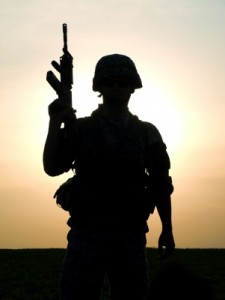 WASHINGTON, D.C. – The U.S. Department of Housing and Urban Development releases its 2012 count of homeless Americans today with a current tally of homeless veterans. According to the National Alliance to End Homelessness (NAEH), a nonprofit group, it expects HUD’s status report will show that a concerted federal effort to house more disabled and low-income veterans is working.
WASHINGTON, D.C. – The U.S. Department of Housing and Urban Development releases its 2012 count of homeless Americans today with a current tally of homeless veterans. According to the National Alliance to End Homelessness (NAEH), a nonprofit group, it expects HUD’s status report will show that a concerted federal effort to house more disabled and low-income veterans is working.
But other advocates – including a small but determined number of soldiers who use their spare time and combat skills to track, clothe and house homeless veterans say they’re seeing an “alarming” rise in younger homeless veterans, many of whom fought in Iraq and Afghanistan.
In Southern California, Army veteran Joe Leal leads a handful of active-duty and former service members on personal missions to find and help homeless veterans living “beneath bridges and in canyons.” Leal says he has encountered thousands of post-9/11 veterans without homes.
“It’s alarming,” said Leal, an Iraq War veteran who founded the Vet Hunters Project in 2010. His group, funded by private donations, has worked to place more than 2,600 veterans in temporary or permanent homes. “We house more Iraq and Afghanistan and younger veterans than older veterans. It used to be where a homeless vet was typically about 60 years old. Now, they’re 22 years old,” he said. “And a lot of them are female veterans who have witnessed combat. They are coming back messed up. They are coming back homeless.”
One such distressed young veteran is Monica Figueroa, 22. She was an Army parachute rigger who served from 2009 to 2011, spending time in Germany, performing test jumps out of planes. She has a 17-month-old son and is married to Sgt. Jason Snyder, a 30-year-old Army reservist, who served four tours in Afghanistan and Iraq. While Snyder was still overseas, Figueroa couldn’t hold a job and couldn’t find a home for herself or her son. She slept in a car for several weeks near Los Angeles. “When we met her, she was living in a garage where they repair vehicles,” said Leal.
“A lot of the active-duty people are getting out even though they don’t have a plan for post-military life,” added Leal. “They’re so fed-up after five to six deployments. They say, ‘I don’t care what I do when I get out, I’ll just figure it out when I get out, but I know I don’t want to do this anymore.’ That’s what I’m running into.”
The Vet Hunters Project recently helped Figueroa, her son and husband move into a furnished temporary apartment in Loma Linda, Calif., and enter a program that provides them financial counseling to prepare for an independent life.
“Before this, my living situation was very unstable, moving from one house to another. Just living anywhere I could, with family members, friends, anybody who could help me for two weeks or so,” Figueroa said. “I had to leave my son with my mother — there was no room for anyone else where they were living. So I stayed in a car that my dad owned. The thing that made it very rough was I had no idea of the benefits I had. All I knew about was the GI Bill. Otherwise, no one ever explained anything else to me (about post-military benefits). I was not prepared for the transition.”
It’s not unusual for the Vet Hunters to come across Army reservists who are still serving the country but who have no home, Leal said. “These guys show up for service looking sharp. Then they leave at the end of the day and go sleep in a Chevy.”
 Off The Grid News Better Ideas For Off The Grid Living
Off The Grid News Better Ideas For Off The Grid Living



